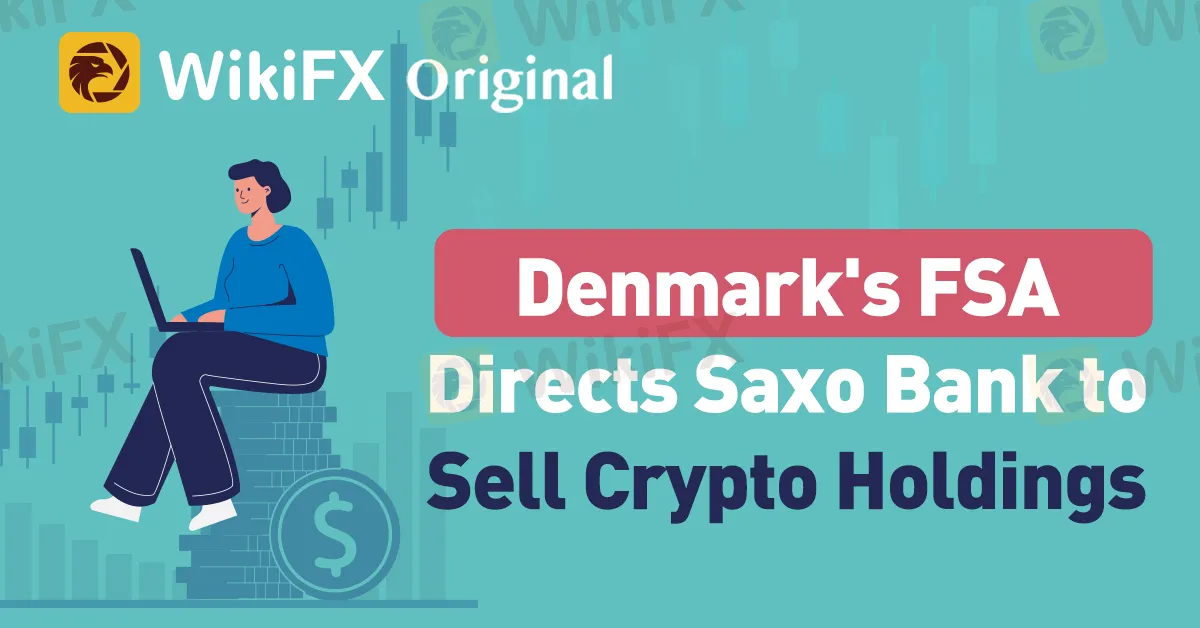简体中文
繁體中文
English
Pусский
日本語
ภาษาไทย
Tiếng Việt
Bahasa Indonesia
Español
हिन्दी
Filippiiniläinen
Français
Deutsch
Português
Türkçe
한국어
العربية
Denmark's FSA Directs Saxo Bank to Sell Crypto Holdings
Abstract:Denmark's financial regulator, the Danish Financial Supervisory Authority (FSA), has directed Saxo Bank to divest its cryptocurrency holdings, citing that it falls outside the bank's authorized activities, while Saxo Bank reports a decline in forex trading volumes for June 2023.

Denmark's financial regulator, the Danish Financial Supervisory Authority (FSA), has instructed Saxo Bank to divest its cryptocurrency holdings, citing that the bank's trading of digital assets for its own accounts falls beyond the scope of its authorized activities as an investment bank.
Saxo Bank, known for its specialization in online trading and investment, offers a comprehensive range of financial products and services, including online trading in stocks, bonds, commodities, forex, contracts for difference, fiat currencies, and cryptocurrencies.
The FSA explains that while Saxo Bank hedges its crypto assets to align with the market risk associated with its digital asset products, the trading of cryptocurrencies is not listed among the supported activities in Appendix 1 of the Danish Financial Business Act.
The financial watchdog further emphasizes that unregulated trading of crypto assets can erode trust in the financial system, and legitimizing such trading would be unjustified for reasons of financial stability, as per Section 24 of the Danish Financial Business Act. Additionally, the FSA notes that crypto trading among financial institutions remains unregulated as the full enforcement of the European Union's Markets in Crypto-Assets (MiCA) regulation is slated for December 30, 2024.

Saxo Bank acknowledges the FSA's decision and expresses its intention to thoroughly review and consider an appropriate response. The bank highlights that its customers gain exposure to cryptocurrencies without direct ownership, and its limited crypto portfolio serves primarily as a risk hedge for facilitating crypto assets, with the majority of exposure being mitigated through exchange-traded and cleared products. Saxo Bank believes that the FSA's decision will have minimal impact on its business operations and client experience.
In terms of trading volumes, Saxo Bank reports an 8% decline in forex trading volumes for June 2023, amounting to $119.5 billion, with the daily average decreasing by 5% to $5.4 billion. Comparing the figures to the same period last year, the drop in total forex volume for June 2023 is more significant, showing a 22% decline from $152.5 billion, while the daily average volume experienced a 21% decrease from $6.9 billion.
Since the beginning of 2022, Saxo Bank's monthly forex trading volumes have shown fluctuations, hitting a low of $102.8 billion in April, the lowest volume since December 2021. However, volumes rebounded, reaching $130.5 billion in May, only to decline once again in June.
Across all markets, Saxo Bank witnessed a 4% decrease in trading volumes, totaling $391.7 billion. The trading volumes for commodities and fixed income experienced significant declines of 21% and 13% respectively, amounting to $32.1 billion and $6.6 billion. Conversely, trading volume in equities displayed a 2% increase, rising from $228.2 billion in May to $233.5 billion in the last month.

Disclaimer:
The views in this article only represent the author's personal views, and do not constitute investment advice on this platform. This platform does not guarantee the accuracy, completeness and timeliness of the information in the article, and will not be liable for any loss caused by the use of or reliance on the information in the article.
Read more

Bybit Shuts Down NFT Marketplace Amid Crypto Market Downturn
Bybit announces the closure of its NFT marketplace, citing efforts to streamline offerings. Discover the latest trends in the declining NFT market and its shift to utility-based growth.

Galaxy Digital Settles $200M in Luna Token Manipulation Case
Galaxy Digital pays $200M to settle Luna token manipulation probe by NY regulators, linked to TerraUSD’s 2022 crash, impacting crypto market stability.

Vanuatu Passes VASP Act to Regulate Crypto and Digital Assets
Vanuatu's new VASP Act regulates crypto businesses, enforcing strict licensing, AML/CFT compliance, and investor protections.

Blockchain Decentralization: Empowering a Trustless Future
In recent years, blockchain technology has rapidly evolved from a niche innovation behind Bitcoin into a transformative force across industries. At its core, blockchain decentralization refers to the distribution of authority and decision-making away from a central entity and into the hands of a distributed network of participants. This shift redefines how data is stored and verified and paves the way for trustless, transparent, and resilient systems that challenge traditional centralized models.
WikiFX Broker
Latest News
Interactive Brokers Launches Forecast Contracts in Canada for Market Predictions
Authorities Alert: MAS Impersonation Scam Hits Singapore
INFINOX Partners with Acelerador Racing for Porsche Cup Brazil 2025
The Impact of Interest Rate Decisions on the Forex Market
Billboard Warns of Crypto Scams Using Its Name – Stay Alert!
STARTRADER Spreads Kindness Through Ramadan Campaign
Rising WhatsApp Scams Highlight Need for Stronger User Protections
A Trader’s Worst Mistake: Overlooking Broker Reviews Could Cost You Everything
How a Housewife Lost RM288,235 in a Facebook Investment Scam
The Daily Habits of a Profitable Trader
Currency Calculator







